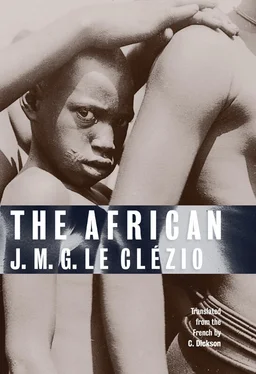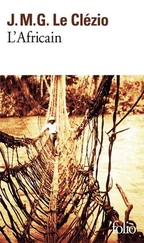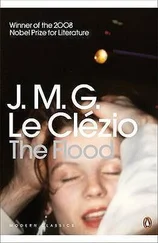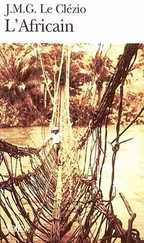His life in Guiana had prepared my father for Africa. After all that time spent on the rivers, he couldn’t go back to Europe — much less to Mauritius, the tiny country where he’d felt imprisoned amongst so many vain, egotistical people. A position had just been created in West Africa, in the strip of land that had been taken away from Germany and put under British mandate at the end of the First World War and that was made up of eastern Nigeria and western Cameroon. My father volunteered. Early in 1928 he found himself aboard a boat skirting the African coast heading for Victoria on the Bay of Biafra.
It is the same journey I took twenty years later with my mother and brother to join my father in Nigeria after the war. But he wasn’t a child being swept along in the current of events. He was thirty-two at the time, a man hardened by two years of medical experience in the tropics of South America, a man familiar with death and disease, having lived with them — unprotected — every day, in emergency situations. His brother Eugène, who was a doctor in Africa before him, had most certainly informed him: the country he was headed for was not easy. Nigeria was of course “pacified,” occupied by the British army. But it was a region in which war was all-pervasive, the war of human beings against one another, the war against poverty, the war against abuse and corruption inherited from colonization, especially the war against germs. In Calabar, in Cameroon, the enemy was no longer Aro Chuku and his oracle, or the army of Fulanis and their long rifles from Arabia. The enemies were called kwashiorkor, vibrio bacteria, tapeworm, bilharzia, smallpox, amoebic dysentery. Confronted with these enemies, my father must have found his medical bag to be very lightweight. Scalpel, surgical clamps, trephine, stethoscope, tourniquets, and a few basic tools, including the brass syringe which he later used for giving me vaccinations. Antibiotics, cortisone didn’t exist yet. Sulfonamides were rare, his powders and unguents looked more like the potions of a witchdoctor. Vaccinations were available in very restricted quantities, for combating epidemics. The territory that needed to be covered in order to carry out the battle against disease was immense. In comparison with what awaited my father in Africa, the expeditions upriver in Guiana undoubtedly seemed like mere outings to him. He was to remain twenty-two years in West Africa, until his physical strength began to decline. He would experience everything there, from the enthusiasm of his beginnings to the discovery of the great rivers, the Niger, the Bénoué, all the way out as far as the Cameroon highlands. He would share love and adventure with his wife, traveling the mountain paths on horseback. Then later the loneliness and anxiety of war, till it wore on him, till it embittered his last moments, the feeling of having surpassed the limits of just one lifetime.
I wasn’t able to understand all of that till much later, in going away — as he had — to travel in another land. I read it, not in the rare objects, the masks, statuettes, and several pieces of furniture he had brought back from the Ibo country and the Grassfields of Cameroon. Nor even in looking at the photographs he took the first few years after arriving in Africa. I found it out by rediscovering, by learning to better see the objects of everyday life that had always been with him, even during his retirement in France; those cups, plates of blue and white enameled metal made in Sweden, the aluminum flatware he’d eaten with all those years, the stacked lunch pails he used to eat out of while in the field staying in travelers’ cabins. And all the other objects, marked, dented from the jolts, bearing the traces of torrential rains and that peculiar faded color caused by the equatorial sun, objects he had refused to get rid of and that were, in his eyes, worth more than any traditional knick-knack or souvenir. His wooden trunks with metal banding, whose hinges and locks he’d repainted several times and upon which I could still read the address of their final destination: General Hospital, Victoria, Cameroons. Aside from that luggage, worthy of a voyager in the days of Kipling or Jules Verne, there was the whole collection of tins of shoe polish and cakes of black soap, the oil lamps, the alcohol burners, and those large tins of Marie biscuits in which he stored his tea and his granulated sugar until the very end of his life. His tools, as well, the surgical instruments that he used in France as cooking utensils, carving the chicken with a scalpel and serving it with a clamp. And lastly, the furniture, not those classical monoxylous stools and thrones of primitive art. He preferred his old folding canvas and bamboo armchair to them, the one he’d carried from one travelers’ cabin to the next over all the mountain tracks, and the little table with a rattan top that he used as a stand for his radio, with which he listened — up until the end of his life — to the BBC news every evening at seven o’clock: Pom pom pom pom! British Broadcasting Corporation, here is the news!
It was as if he had never left Africa. When he returned to France, he continued his work-a-day habits — up at 6 A.M., dressed (always in those khaki pants of his), shoes polished, hat on head, ready to go out shopping at the market (just as he used to go on the rounds at the hospital), home at 8 A.M. to cook the meal — as meticulously as he would carry out a surgical procedure. He had retained all of the fussy habits of an ex-military man. The man who had trained to be a doctor in remote countries — who had learned to be ambidextrous, able to operate on himself using a mirror or to stitch up his own hernia. The man with the calloused hands of a surgeon, who could saw through a bone or put a splint in place, who could make knots and splices — that man no longer used his energy and knowledge for anything but those minute unrewarding tasks that most people in retirement refuse to do: with equal application, he would wash the dishes, repair the broken floor tiles in his apartment, wash his clothing, darn his socks, build benches and shelves out of crate wood. Africa had left a mark on him that fit closely with the legacy of the spartan upbringing he’d received from his family in Mauritius. The Western-style clothing he donned every morning to go to market must have made him uncomfortable. As soon as he returned home, he would slip into a large blue shirt like the tunics the Haoussas of Cameroon wear and wouldn’t take it off until bedtime. That is my perception of him at the end of his life. No longer the adventurer or the inflexible military man. But rather an old man out of his element, exiled from his life and his passion for medicine, a survivor.
* * *
For my father, Africa had begun when he landed on the Gold Coast, in Accra. A typical picture of the colonies: European travelers, dressed in white and wearing Cawnpore helmets being disembarked in a basket and taken to shore in a pirogue navigated by black people. That Africa wasn’t terribly disorienting: it was the narrow band of land that followed the contours of the coast, from the tip of Senegal down to the Gulf of Guinea that everyone coming from the metropolises to do business and turn a quick profit was familiar with. A society that had, in less than half a century, structured itself into castes, reserved domains, taboos, privileges, abuses, and profits. Bankers, salesmen, civil or military administrators, judges, policemen, and gendarmes. All around them, in the large port cities, Lomé, Cotonou, Lagos, as in Georgetown in Guiana, a clean, luxurious zone had been created, with perfect lawns and golf courses, and palaces built of stucco or rare woods amid vast palm groves on the banks of an artificial lake, like the residence of the director of medical services in Lagos. A little farther out, the circle of the colonized with the complex framework described by Rudyard Kipling with regards to India and by Rider Haggard concerning East Africa. The servant echelon — that expandable buffer of intermediaries — clerks, lackeys, guard dogs, drudges (there’s no dearth of words!), dressed in semi-European style, wearing shoes and carrying black umbrellas. Lastly, on the outer edges, there was the immense ocean of Africans, who knew Westerners only through their orders or the almost unreal vision of a sleek black car roaring through their neighborhoods and villages in a cloud of dust, honking.
Читать дальше












